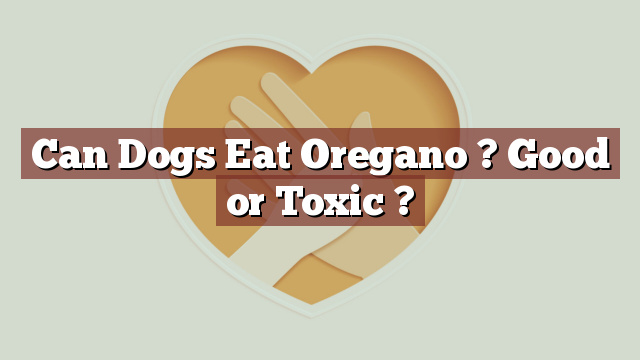Can Dogs Eat Oregano? Good or Toxic?
Dogs love to explore new flavors and often show an interest in our food. As responsible pet owners, it is crucial to know which foods are safe and nutritious for our furry friends. Oregano, a popular herb in many culinary dishes, is one such food that may spark curiosity. In this article, we will explore whether dogs can safely consume oregano and if it offers any health benefits.
Nutritional Value of Oregano: Vitamins, Minerals, and Antioxidants
Oregano is a herb that is widely used in Mediterranean and Italian cuisine. It not only adds a delightful flavor to our meals but also provides several nutritional benefits. Oregano is rich in vitamins such as vitamin K, vitamin E, and vitamin C. It also contains essential minerals like calcium, iron, and manganese. Furthermore, oregano is packed with antioxidants, which can help protect against cell damage.
Can Dogs Eat Oregano? Exploring Safety and Toxicity
The answer to the question, "Can dogs eat oregano?" is yes, dogs can consume oregano in moderation. However, it is essential to note that the consumption of oregano should be limited and only given as an occasional treat. While oregano is generally safe for dogs, there are a few considerations to keep in mind.
Oregano contains essential oils, such as thymol and carvacrol, which give it its unique flavor and aroma. In high quantities, these compounds can potentially upset a dog’s digestive system. Additionally, some dogs may have allergies or sensitivities to herbs, including oregano. Therefore, it is crucial to introduce oregano gradually and observe any adverse reactions.
Potential Risks and Benefits of Oregano Consumption in Dogs
When given in moderation, oregano can offer some potential health benefits to dogs. The antioxidants present in oregano can help combat free radicals and reduce oxidative stress. Additionally, oregano has antimicrobial properties that may help fight certain bacterial infections. However, it is important to remember that these benefits are most significant when oregano is incorporated into a well-balanced diet.
On the other hand, excessive consumption of oregano can lead to digestive issues in dogs. These may include symptoms such as vomiting, diarrhea, or abdominal pain. It is crucial to monitor your dog’s reaction to oregano and seek veterinary advice if any concerning symptoms arise.
What to Do If Your Dog Eats Oregano: Monitoring and Treatment
If your dog accidentally consumes a small amount of oregano, it is unlikely to cause any significant harm. However, it is still important to keep a close eye on your dog for any digestive issues or allergic reactions. In the event of excessive consumption or adverse symptoms, it is recommended to contact your veterinarian for guidance.
Conclusion: Moderation and Consultation for a Healthy Canine Diet
In conclusion, oregano can be enjoyed by dogs in moderation. While it contains beneficial nutrients and antioxidants, it is crucial to introduce it slowly and monitor your dog’s reaction. As with any new addition to your dog’s diet, it is always best to consult with your veterinarian. They can provide personalized guidance based on your dog’s specific needs and health conditions.
Remember, a varied and balanced diet is key to maintaining your dog’s overall health and well-being. By understanding what foods are safe and appropriate for your furry friend, you can ensure they enjoy a nutritious and delicious diet.
Thank you for investing your time in exploring [page_title] on Can-Eat.org. Our goal is to provide readers like you with thorough and reliable information about various dietary topics. Each article, including [page_title], stems from diligent research and a passion for understanding the nuances of our food choices. We believe that knowledge is a vital step towards making informed and healthy decisions. However, while "[page_title]" sheds light on its specific topic, it's crucial to remember that everyone's body reacts differently to foods and dietary changes. What might be beneficial for one person could have different effects on another. Before you consider integrating suggestions or insights from "[page_title]" into your diet, it's always wise to consult with a nutritionist or healthcare professional. Their specialized knowledge ensures that you're making choices best suited to your individual health needs. As you navigate [page_title], be mindful of potential allergies, intolerances, or unique dietary requirements you may have. No singular article can capture the vast diversity of human health, and individualized guidance is invaluable. The content provided in [page_title] serves as a general guide. It is not, by any means, a substitute for personalized medical or nutritional advice. Your health should always be the top priority, and professional guidance is the best path forward. In your journey towards a balanced and nutritious lifestyle, we hope that [page_title] serves as a helpful stepping stone. Remember, informed decisions lead to healthier outcomes. Thank you for trusting Can-Eat.org. Continue exploring, learning, and prioritizing your health. Cheers to a well-informed and healthier future!

